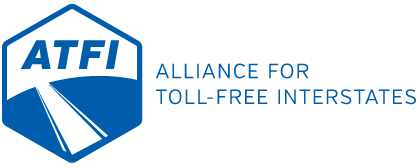January 31, 2020
Delivered via email
Transportation Committee
Connecticut General Assembly
Legislative Office Building, Room 2300
Hartford, CT 06106
Re: Opposition to LCO No. 373 and the use of tolls
Dear Mr. Chairmen and Members of the Committee:
Thank you for your steadfast time, energy and work on behalf of the state of Connecticut. As you know, the Transportation Committee (TC) has a tremendous responsibility regarding surface transportation in Connecticut and the Connecticut Department of Transportation (CDOT). Given your role, we write to express our concerns with tolling heavy trucks throughout the state of Connecticut and opposition to LCO No. 373, “An Act Concerning the Sustainability of Connecticut’s Transportation Infrastructure.”
The Alliance for Toll-Free Interstates (ATFI) is a grassroots organization whose mission is to educate the public about the negative impacts of tolling and advocate against tolling existing interstates. We believe certain members of the Connecticut General Assembly and Governor Ned Lamont have failed to consider the reality of tolling impacts when they pursued pro-tolling language in LCO No. 373. While we are glad to see the TC looking for serious solutions to Connecticut’s transportation problems, we urge the Committee to exclude recommendations of tolls and vote against this “working draft” bill. Tolling existing interstates will hurt Connecticut drivers, families, communities and businesses. ATFI’s many Connecticut members continue to oppose tolls in Connecticut, just as we have in years past.
Imposing tolls on heavy trucks in Connecticut will increase shipping costs for goods, suppress consumer activity, waste taxpayer dollars on bureaucratic administration, double-tax businesses, divert traffic onto local roads, and negatively impact residents and communities located around toll facilities. Efforts to toll are simply efforts designed to hurt Connecticut’s economic future and fragment the state’s road network.
Tolling trucks will raise costs for moving goods through the supply chain, hurting the competitiveness of local Connecticut companies. Restaurants, convenience stores, travel plazas and gas stations operating near the interstates will face higher costs from manufacturers and shippers, who will be forced to charge more to transport goods by truck. Everyday consumers will be shouldering the burden by paying more for goods. Truck tolls are nothing more than an underhanded tax on the general public. Inevitably, truck tolls will have a chilling effect on consumer activity.
Moreover, tolling is fiscally irresponsible and financially inefficient. Toll gantries cost millions of dollars to build and maintain. Even with the latest technology, collection costs are at least 8 to 11 percent of revenue collected, according to the Congressional Budget Office. On the other hand, increasing fuel taxes has a less than 1% administration fee. Along with registration fees, traditional taxes and fees do not increase collection costs and assure that nearly 100% of revenue can go toward infrastructure improvements.
To toll drivers on top of these fuel taxes is double taxation. Since the inception of the Federal Interstate Highway System, the federal gas tax has always been the primary source of revenue for the construction and maintenance of federal interstate lanes. Every time a motorist puts gas in his vehicle, he is upholding his end of the deal for interstate maintenance. A new toll on an existing interstate, even when relegated to trucks only, forces drivers to pay two taxes for that same road: a gas tax and a toll tax.
Additionally, tolls will force truck drivers to use secondary roads to avoid these new toll taxes. This diversion causes congestion and delays response times for emergency personnel who rely on these secondary routes to quickly get to and from accidents and emergencies. A 2013 study on the consequences of tolling an existing road, Interstate 95, in North Carolina predicted that tolls would divert up to 36% of traffic to alternate routes, contributing to delays, traffic accidents, and wear and tear on smaller secondary roads that were not built to handle high traffic levels.
As policymakers consider truck-only tolls for Connecticut, they should be aware of the actions of their counterparts in Rhode Island. Truck-only tolls were implemented there recently, and the policy is being challenged in court. That lawsuit consumes taxpayer dollars in defense of a policy that simply doesn’t serve the taxpayers’ interests. Connecticut would do well to avoid this path.
We need to make it easier for businesses to succeed, not harder. We need more opportunities in order for more people to relocate here and lift the region’s economy. State and local officials have spent years working on plans to promote growth and opportunity here; tolls would undercut all of those efforts and hamstring future progress. The region and the state need a transportation plan that works.
Thank you again for your dedicated efforts. We appreciate your understanding about the negative impacts that tolling trucks will have on Connecticut’s citizens, businesses, and economy. ATFI urges you and the Transportation Committee to reject tolling and focus on efficient, sustainable solutions.
###
To learn more about AFTI and join the Alliance please visit www.tollfreeinterstates.com. In addition to joining ATFI you can stay connected with the Alliance on Twitter at @No2Tolls and Facebook at https://www.facebook.com/TollFreeInterstates.

